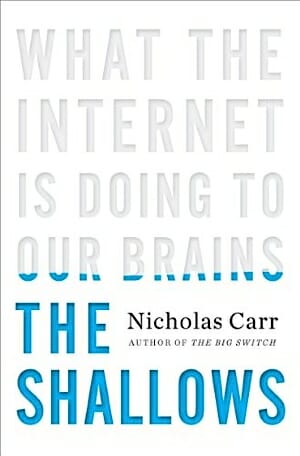The Shallows: What The Internet is Doing To Our Brains by Nicholas Carr
Thoughtful Luddism

(Editor’s Warning: Reading This Book Review May Rewire your Neurons)
I take it on faith that the virtual world, no matter how dazzling it can be, will never supplant the real. Take sex, for example: At the end of the day, it would be delusional to believe that online pornography, no matter how fascinating and titillating, could ever be the equivalent of real sex.
Still, I worry that I’ll end up on the same losing side as the Luddites, because we are remarkably quick to give up time spent with real communities for time spent in so-called ‘online communities.’ A lot of our real friends get less of our time than our Facebook friends. While it’s always been difficult to engage in real conversations with people about emotionally charged moral or political issues, it’s sure easy to leave witty, caustic comments at the bottom of an editorial comments page. It’s a no-brainer to me that when we choose to privilege the virtual over the real, we’re betting on the wrong horse. (Even saying that, I can hear the technophiles whispering their scorn for Luddite detractors like me.)
First, then, let’s clear up a basic misconception about the Luddites: they were never against technology. “‘Luddite’ has come to mean an almost childish and certainly naïve opposition to technology,” wrote Neil Postman. “But the historical Luddites were neither childish nor naïve.” The Luddites were wholeheartedly for meaningful community and its workers. The Luddites of the late-18th early-19th century broke into textile factories and smashed the mechanical looms not because they didn’t like machines, but because they saw that the mechanization and industrialization of the textile industry posed a catastrophic threat to their work, family, community and culture. Luddites knew good and well how, by saying ‘yes’ to the elaborate promises of growth and efficiency that accompanied mechanization, they would also be waving goodbye to an entire way of life. Their thoughtful destructiveness was an effort to guard and nurture the things they loved most. But the Luddites were eventually routed by the military, bent on protecting private property rather than defending the genuine interests of the public. The Luddites ultimately lost their battle in defense of small, humanizing, community-minded business and trade. The grand promises of innovation prevailed, and the march—or steam-roller—of progress rolled on.
Maybe self-identified “anarcho-primitivists” like John Zerzan and Derrick Jensen would claim to be against technology. But among the thoughtful Luddites I know, not one of them is authentically against technology in toto, because being against technology is nearly impossible. Even the pencil I used to write the first draft of this review is a technology, and a highly advanced one at that. Written language, the postal system, lined paper, nail clippers, corrective lenses, mathematics, birth control—technologies, every one of them, highly advanced and vital to everyday life for most of us.
But thoughtful Luddism poses critical questions about high-tech gadgets and the pulsing heart of all things high-tech, including the Internet. The fundamental question boils down to this: For all that we’re gaining in connectivity, digital access, storage capacity, and processing power, what are we, at the same moment, losing?
That’s the question behind Nicholas Carr’s book, The Shallows: What The Internet Is Doing To Our Brains. Carr has been writing about technology for more than a decade, and this is his third book on technology. He earned a lot of attention for a piece in The Atlantic in 2008, “Is Google Making Us Stupid?” The Shallows is basically a book-length version of this piece.
Carr opens by recalling his suspicion that screen-time was messing with his ability to think. “Over the last few years,” writes Carr, “I’ve had the uncomfortable sense that someone, or something, has been tinkering with my brain, remapping the neural circuitry, reprogramming the memory. I’m not thinking the way I used to think.” For all the power the Internet put at his fingertips, he felt he was letting go of something important.
-

-

-

-

-

-

-

-

-

-

-

-

-

-

-

-

-

-

-

-

-

-

-

-

-

-

-

-

-

-

-

-

-

-

-

-

-

-

-

-








































